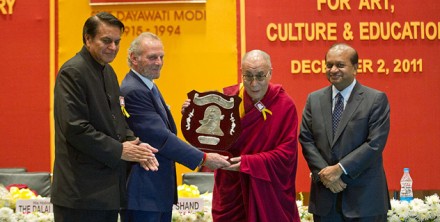DHARAMSHALA: Receiving Dayawati Modi Award for Art, Culture and Education for his contribution towards universal peace, tolerance and social justice in New Delhi yesterday, His Holiness the Dalai Lama has said women should take more active role towards building the world more peaceful and compassionate.

“It is our honour to confer the award on His Holiness in recognition of his lifetime contribution towards universal peace, tolerance and social justice,” Dayawati Modi Foundation president Satish Kumar Modi said.
His Holiness has joined the list of previous awardees who include late Mother Teresa, actor Amitabh Bachchan, late singer Jagjit Singh, and Asha Bhonsle, he said.
The award award has been instituted by the Dayawati Modi Foundation for Art, Culture and Education of the Modi group in the memory of Late Mrs Dayawati Modi, wife of late Rai Bahadur Gujar Mal Modi, founder of the Modi Group.
Late Mrs Dayawati Modi was a great philanthropist and an educationist. The Foundation has established schools and colleges, libraries and hostels for students. It also seeks to spread the knowledge of Indian art and culture through cultural shows, exhibitions and seminars.
After accepting the award His Holiness spoke on the women’s power in building a peaceful and compassionate world. “Women have more inborn potential to build a society on the foundation of love and compassion, as they are more loving and compassionate.”
His Holiness stressed for the need of a education system to promote inner values like affection and warmheartedness. “The modern education system is materialistic oriented, one-sided, and concerned only about brain development and neglect warmheartedness and the sense of responsibility,” he said.
He further said, “despite having very good modern education system, the highly developed countries have lots of problems. Scientists and social workers have understood that social problems like unrest and violence among the younger generation were due to lack of human affection in the existing system. Starting from the family level, lack of affection causes competition, which bring suspicion, distrust, and loneliness. So, we really need more effort in the promotion of warmheartedness from the society to the global level.”
Describing mothers as the source of affection and foundation of a happier family, His Holiness said the females have more potential for loving kindness and are more sensitive towards others’ pain. “Even in animals, mothers take more care of their young ones,” he said.
To buttress his logic, His Holiness recounted his own experiences. “Once flying in a plane, I noticed how one couple look after their two little children. They both first took care of their children, the older who often running around, while the younger one always crying. But around midnight, the father was sleeping and the mother, throughout the night, took care of her two children. The next morning her eyes were red as she really sacrificed her sleep to fully take care of her children. So, biologically, females are more sensitive towards others’ pain,” he said.
Speaking of his mother, His Holiness said, “even though illiterate, my mother was very kind and warmhearted towards her children. She never showed angry face to them. So, the real seed of my compassion came from my mother, though Buddhist training immensely helped in strengthening my altruism.”
“One who receives maximum affection and love in their childhood tend to much happier with more self-confidence. On the contrary, those who lack affection and love, have deep inside some sense of insecurity. So in order to build a happier generation, mothers have immensely important role to play,” His Holiness said.
On women taking on leadership role, His Holiness said presumably, under a more matured female leadership, there is less danger of violence.
“Now, the time has come to make more real effort in the promotion of warmheartedness, affection, compassion, for which the females should take more active role,” His Holiness said.
His Holiness was to give a talk on The Art of Happiness in the afternoon today as part of the Penguin Annual Lecture Series at the India Habitat Center.
